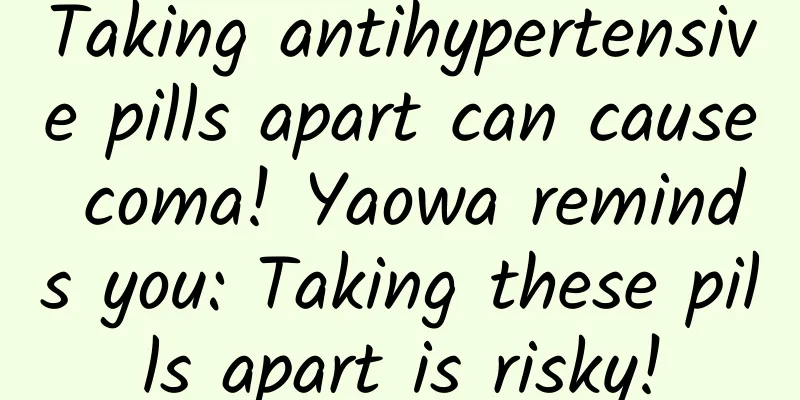Taking antihypertensive pills apart can cause coma! Yaowa reminds you: Taking these pills apart is risky!

|
According to CCTV News, Ms. Zhang from Fujian has a history of hypertension for more than a year. Recently, her blood pressure reached 160/100 mmHg. She thought she was not taking enough antihypertensive medicine, so she bit off the antihypertensive medicine she took daily with her teeth and ate most of it. Unexpectedly, within half an hour, Ms. Zhang suddenly felt dizzy, broke out in cold sweats, and collapsed on the sofa. Her family rushed her to the hospital. The doctor said that the antihypertensive drug Ms. Zhang took was nifedipine controlled-release tablets, one tablet of which was equivalent to the dosage of three ordinary nifedipine tablets. Once it is crushed, broken, ground and taken, the large dose of the antihypertensive drug's active ingredients will be instantly released into the body, causing blood pressure to drop rapidly. Like Ms. Zhang, many people have the experience of breaking or grinding pills when taking medicine. So, can pills be broken into pieces and taken? What are the possible risks of breaking pills into pieces and taking them? 1. Ordinary tablets, dispersible tablets and effervescent tablets Ordinary tablets and dispersible tablets are relatively uniform in nature and can be quickly disintegrated and absorbed after entering the human body. They can be broken, crushed or chewed for consumption, such as calcium carbonate D₃ chewable tablets and cefixime dispersible tablets. However, for drugs that require precise dosages, such as levothyroxine sodium tablets for the treatment of thyroid diseases, it is difficult to ensure the accuracy of the dosage after breaking them by hand. Excessive dosage may cause hyperthyroidism symptoms such as palpitations and sweating, while insufficient dosage cannot effectively control the condition of hypothyroidism. If it is really necessary to break it, it is recommended to use a professional medicine splitter. In addition, it should be noted that: effervescent tablets can be broken or crushed, but they are strictly prohibited to be taken orally, taken dry, or swallowed directly. They must be taken after being soaked in water. Because effervescent tablets will produce a lot of gas when they come into contact with water, taking them directly can easily cause choking or even suffocation. 2. Sugar-coated tablets, film-coated tablets, enteric-coated tablets and other coated tablets Coated tablets are like putting "clothes" on the outside of the medicine. According to the type of "clothes", coated tablets can be divided into sugar-coated tablets, film-coated tablets and enteric-coated tablets. It is generally not recommended to break these drugs apart before taking. This is because some drugs have unpleasant odors or bitter tastes, and making them into sugar-coated tablets or film-coated tablets can effectively mask these undesirable characteristics. If they are broken apart, it may cause difficulties for patients to take the medicine, especially for children and patients who are sensitive to taste. In addition, sugar-coated tablets or film-coated tablets can make the surface of the tablet smoother and easier to swallow. Breaking them apart may make the tablets rough, increasing the difficulty and discomfort of swallowing. Enteric-coated tablets are made by wrapping a layer of enteric coating on the outside of ordinary tablets, so that the drug does not disintegrate in acidic gastric juice, but can disintegrate and be absorbed in alkaline intestinal juice. Commonly used enteric-coated aspirin tablets are made to reduce the irritation to the gastric mucosa, considering that aspirin has a certain irritation to the stomach. If the drug is broken open and taken, the enteric coating of the drug will be destroyed, and the protective effect on the gastric mucosa will be lost. 3. Sustained-release tablets and controlled-release tablets Except for drugs with notches on the tablets (such as metoprolol sustained-release tablets), which can be broken apart for taking, sustained-release tablets or controlled-release tablets should generally be swallowed whole. If broken apart for taking, the sustained-release and controlled-release structure of the drug will be destroyed, and the stable blood drug concentration cannot be maintained, thus affecting the efficacy. In addition, if broken apart, the risk of adverse drug reactions will increase, and even toxic reactions may be caused, due to the large amount of drug released in a short period of time. The nifedipine controlled-release tablets taken by Ms. Zhang release the drug at a constant rate, timed and quantitative manner within 24 hours, so that blood pressure control is relatively stable. Breaking it apart will lead to rapid and large-scale release of the drug, resulting in a rapid drop in blood pressure and coma. 4. Capsules Ordinary capsules can be taken after opening the capsule shell while ensuring accurate dosage. However, since many drugs have a bitter taste and bad smell, making them into capsules can effectively cover up the unpleasant taste and improve patients' medication compliance. If the capsule shell is blindly broken open and the drug is taken directly, the protective effect of the capsule will be lost. In addition, some capsules are made into sustained-release and enteric-coated forms. Once opened, these functions will be lost, resulting in rapid release of the drug and increasing the possibility of adverse drug reactions. Generally speaking, ordinary tablets and dispersible tablets can be broken apart and taken unless otherwise specified in the drug instructions; however, sustained-release tablets, controlled-release tablets, enteric-coated tablets, etc., cannot be broken apart and taken in most cases. The dosage form of the drug is hard to remember, and you need to know how to take the drug. Ordinary preparations can be broken apart, but care must be taken to ensure accurate dosage. Don't separate enteric-coated sustained-release tablets, adverse reactions can harm your body. Don't rush before taking the medicine, read the instructions carefully. |
<<: #千万IP创科普# Please avoid these health care misunderstandings of the elderly! |银龄科普
>>: Can a mother still breastfeed if she has a cold?
Recommend
Products for women to improve immunity
The weaker the immunity, the weaker the body'...
I haven't had my period yet 36 days after the abortion.
Abortion is a type of artificial abortion surgery...
What are the harms of curettage to the human body?
Curettage is a treatment method different from ab...
How many days does a painless abortion usually last?
Nowadays, many women give birth to children, whic...
What are the ways for girls to lose belly fat and train abdominal muscles?
Obese women have a common characteristic: they ha...
How to regulate the poor physical condition of pregnant women
Everyone's physical fitness is different. Som...
What diseases can cause vaginal bleeding?
I believe that some women will encounter some vag...
Causes of brown vaginal bleeding
It is normal for women to secrete leucorrhea, but...
Can wearing underwear make your breasts bigger?
In a woman's wardrobe, everything can be miss...
What are the reasons for delayed menstruation?
Late menstruation is a problem that cannot be und...
Can I drink vinegar during my period?
In fact, there are not so many dietary taboos dur...
Can I have sex if there is a little inflammation in my leucorrhea?
Under normal circumstances, women's leucorrhe...
What causes polycystic ovary syndrome?
Polycystic ovary is one of the main causes of fem...
Is it necessary to have a uterine curettage if lochia is not discharged completely?
We all know that lochia will appear after childbi...
What should I do if I have severe constipation during breastfeeding?
Constipation during breastfeeding is relatively c...









